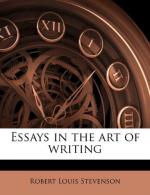‘Mother Athens, eye of Greece,’
or merely ‘Mother Athens,’ and the game is up, for the trochaic beat has been suggested. The eccentric scansion of the groups is an adornment; but as soon as the original beat has been forgotten, they cease implicitly to be eccentric. Variety is what is sought; but if we destroy the original mould, one of the terms of this variety is lost, and we fall back on sameness. Thus, both as to the arithmetical measure of the verse, and the degree of regularity in scansion, we see the laws of prosody to have one common purpose: to keep alive the opposition of two schemes simultaneously followed; to keep them notably apart, though still coincident; and to balance them with such judicial nicety before the reader, that neither shall be unperceived and neither signally prevail.
The rule of rhythm in prose is not so intricate. Here, too, we write in groups, or phrases, as I prefer to call them, for the prose phrase is greatly longer and is much more nonchalantly uttered than the group in verse; so that not only is there a greater interval of continuous sound between the pauses, but, for that very reason, word is linked more readily to word by a more summary enunciation. Still, the phrase is the strict analogue of the group, and successive phrases, like successive groups, must differ openly in length and rhythm. The rule of scansion in verse is to suggest no measure but the one in hand; in prose, to suggest no measure at all. Prose must be rhythmical, and it may be as much so as you will; but it must not be metrical. It may be anything, but it must not be verse. A single heroic line may very well pass and not disturb the somewhat larger stride of the prose style; but one following another will produce an instant impression of poverty, flatness, and disenchantment. The same lines delivered with the measured utterance of verse would perhaps seem rich in variety. By the more summary enunciation proper to prose, as to a more distant vision, these niceties of difference are lost. A whole verse is uttered as one phrase; and the ear is soon wearied by a succession of groups identical in length. The prose writer, in fact, since he is allowed to be so much less harmonious, is condemned to a perpetually fresh variety of movement on a larger scale, and must never disappoint the ear by the trot of an accepted metre. And this obligation is the third orange with which he has to juggle, the third quality which the prose writer must work into his pattern of words. It may be thought perhaps that this is a quality of ease rather than a fresh difficulty; but such is the inherently rhythmical strain of the English language, that the bad writer—and must I take for example that admired friend of my boyhood, Captain Reid?—the inexperienced writer, as Dickens in his earlier attempts to be impressive, and the jaded writer, as any one may see for himself, all tend to fall at once into the production of bad




